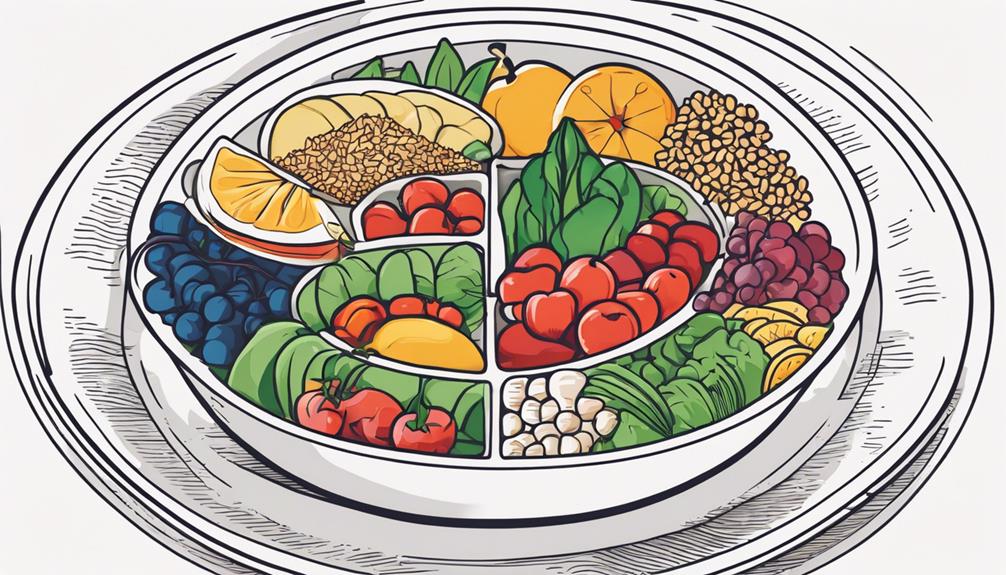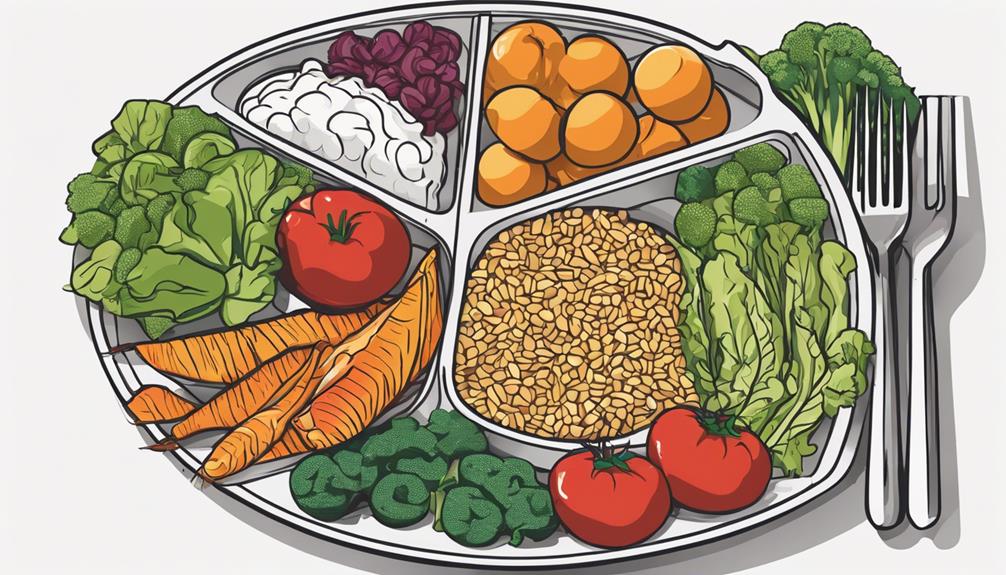You know the saying, 'you are what you eat.' When it comes to managing diabetes, this couldn't be more accurate. Effective diet plans are crucial in keeping your blood sugar levels in check and your overall health on the right track.
But where do you start? Let's explore the key components of a successful diabetes-friendly diet that can make a significant difference in your daily life.
Key Takeaways
- Prioritize balanced meals with carbohydrates, protein, and healthy fats for diabetes management.
- Count carbohydrates and opt for whole foods to control blood sugar levels effectively.
- Establish a consistent meal schedule and portion control routine to stabilize blood glucose.
- Choose high-fiber snacks and incorporate fiber-rich foods for better blood sugar control.
Importance of Balanced Meals

When managing diabetes, prioritizing balanced meals is crucial for stabilizing blood sugar levels and promoting overall health. Nutrient balance is key in meal planning for individuals with diabetes. Aim for a combination of carbohydrates, protein, and healthy fats in each meal to help manage blood sugar levels effectively.
When planning your meals, focus on incorporating a variety of nutrient-dense foods. Opt for whole grains like quinoa or brown rice, lean sources of protein such as chicken or tofu, and healthy fats like avocado or nuts. These choices not only provide essential nutrients but also help in maintaining steady blood sugar levels throughout the day.
Additionally, portion control plays a significant role in managing diabetes. Be mindful of serving sizes and try to balance your plate with the right proportions of different food groups. Planning your meals ahead of time can assist you in making healthier choices and avoiding impulsive decisions that may negatively impact your blood sugar levels. Remember, small changes in your meal planning can lead to significant improvements in your overall health.
Carb Counting for Blood Sugar
Counting carbohydrates is a fundamental aspect of managing blood sugar levels effectively for individuals with diabetes. By keeping track of the amount of carbs you consume, you can better control your blood sugar levels and make more informed food choices. Carbohydrates directly impact blood sugar levels as they're broken down into glucose, affecting the body's insulin management.
When carb counting, focus on whole foods like fruits, vegetables, whole grains, and lean proteins. These foods not only provide essential nutrients but also have a slower impact on blood sugar levels compared to processed foods. Reading nutrition labels can help you determine the carb content in packaged foods, enabling you to make healthier choices.
It's crucial to work with your healthcare team to determine the appropriate amount of carbs for your meals and snacks based on your individual needs. By understanding how different foods affect your blood sugar levels, you can make informed decisions that support better insulin management and overall health.
Portion Control and Timing

To effectively manage your blood sugar levels and support your overall health with diabetes, mastering portion control and timing of your meals is crucial. Here are some practical tips to help you navigate portion control and meal timing:
- Watch Your Portions: Be mindful of portion sizes by using smaller plates, measuring your food, and paying attention to serving sizes. This can prevent overeating and help regulate your blood sugar levels.
- Eat Regularly: Establish a routine for your meals and snacks. Consistency in meal timing can aid in stabilizing your blood sugar levels throughout the day. Aim for three balanced meals and healthy snacks in between if needed.
- Choose Smart Snack Options: Opt for nutrient-dense snacks like raw vegetables with hummus, Greek yogurt with berries, or a small handful of nuts. Avoid sugary snacks and instead go for options that provide sustained energy and keep you feeling full longer.
Fiber-Rich Food Choices
Incorporate fiber-rich foods into your meals consistently to enhance your diabetes management and overall well-being. High fiber snacks like almonds, chia seeds, or berries can be excellent choices to keep you feeling full and help stabilize blood sugar levels. These snacks are convenient and can be easily incorporated into your daily routine, providing a healthy option when hunger strikes. Remember to read labels and choose snacks with at least 3 grams of fiber per serving.
If you find it challenging to meet your daily fiber needs through food alone, fiber supplements can be a useful addition. Psyllium husk and glucomannan are common types of fiber supplements that can help boost your fiber intake. However, it's essential to consult with your healthcare provider before adding supplements to your diet to ensure they're suitable for you.
Creating a Meal Schedule

Establishing a consistent meal schedule plays a crucial role in managing your diabetes effectively and maintaining stable blood sugar levels throughout the day. By planning your meals carefully and timing them strategically, you can make a significant impact on your health and well-being.
Here are three key tips to help you create a meal schedule that works for you:
- Meal Preparation: Dedicate some time each week to plan and prepare your meals in advance. This can help you make healthier choices and avoid impulsive decisions that may negatively affect your blood sugar levels.
- Timing Strategies: Aim to eat at regular intervals throughout the day to keep your blood sugar levels steady. Consider spreading your carbohydrate intake evenly across your meals and snacks to prevent sudden spikes or drops in blood sugar.
- Flexibility: While consistency is essential, it's also important to be flexible with your meal schedule. Listen to your body and adjust your eating times as needed to better manage your diabetes and overall well-being.
Frequently Asked Questions
Can I Still Enjoy Desserts and Sweets While Following an Effective Diet Plan for Managing Diabetes?
You can enjoy desserts and sweet indulgences while managing diabetes. Opt for sugar-free or low-sugar options like fruit salads, sugar-free gelatin, or dark chocolate. Moderation is key to balancing satisfaction with health goals.
Are There Any Specific Types of Exercise That Complement a Balanced Meal Plan for Diabetes Management?
To complement a balanced meal plan for managing diabetes, consider incorporating exercise routines that align with your meal timing. Activities like walking after meals or combining strength training with protein-rich meals can help stabilize blood sugar levels.
How Can I Navigate Social Situations and Dining Out While Sticking to My Diet Plan for Diabetes?
When navigating social gatherings or dining out, opt for grilled proteins, veggies, and whole grains. Choose salads with dressing on the side. Be mindful of portions, ask for substitutions, and limit sugary drinks.
Are There Any Specific Supplements or Vitamins Recommended for Individuals With Diabetes Following a Meal Schedule?
When managing diabetes, consider supplements like vitamin D, magnesium, and omega-3 fatty acids. These can support your nutrient requirements and help regulate blood sugar levels post-meals. Remember to time your meals to prevent spikes.
How Can I Effectively Track My Progress and Make Adjustments to My Diet Plan for Managing Diabetes?
To effectively track progress and adjust your diet for managing diabetes, start by monitoring blood sugar levels regularly. Use a food diary to record meals and note how they impact your levels, then make modifications as needed for better control.
Conclusion
In conclusion, managing diabetes with effective diet plans is like fueling a well-oiled machine. By incorporating balanced meals, carb counting, portion control, and fiber-rich foods into your daily routine, you can keep your blood sugar levels in check and maintain overall health.
Remember, your body is a finely tuned instrument that requires proper care and attention. Stick to your meal schedule like a well-rehearsed symphony to achieve optimal results.
Your health is worth the effort.